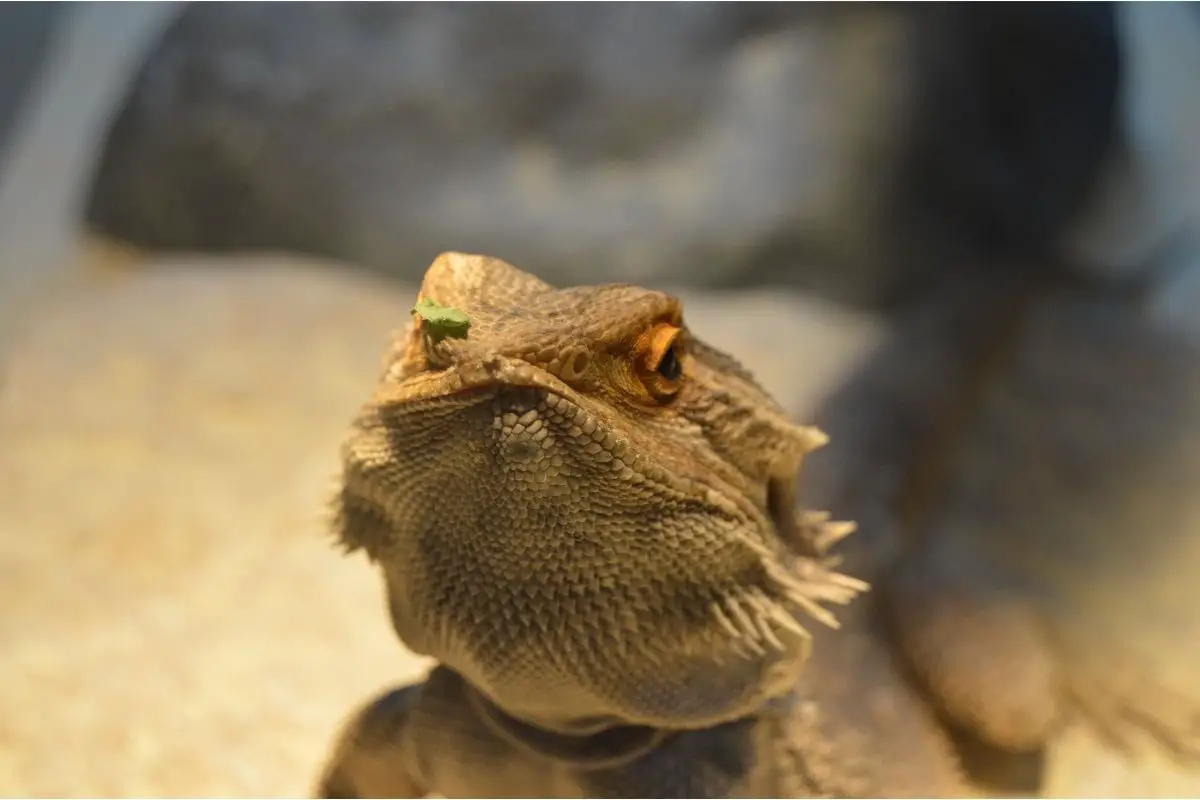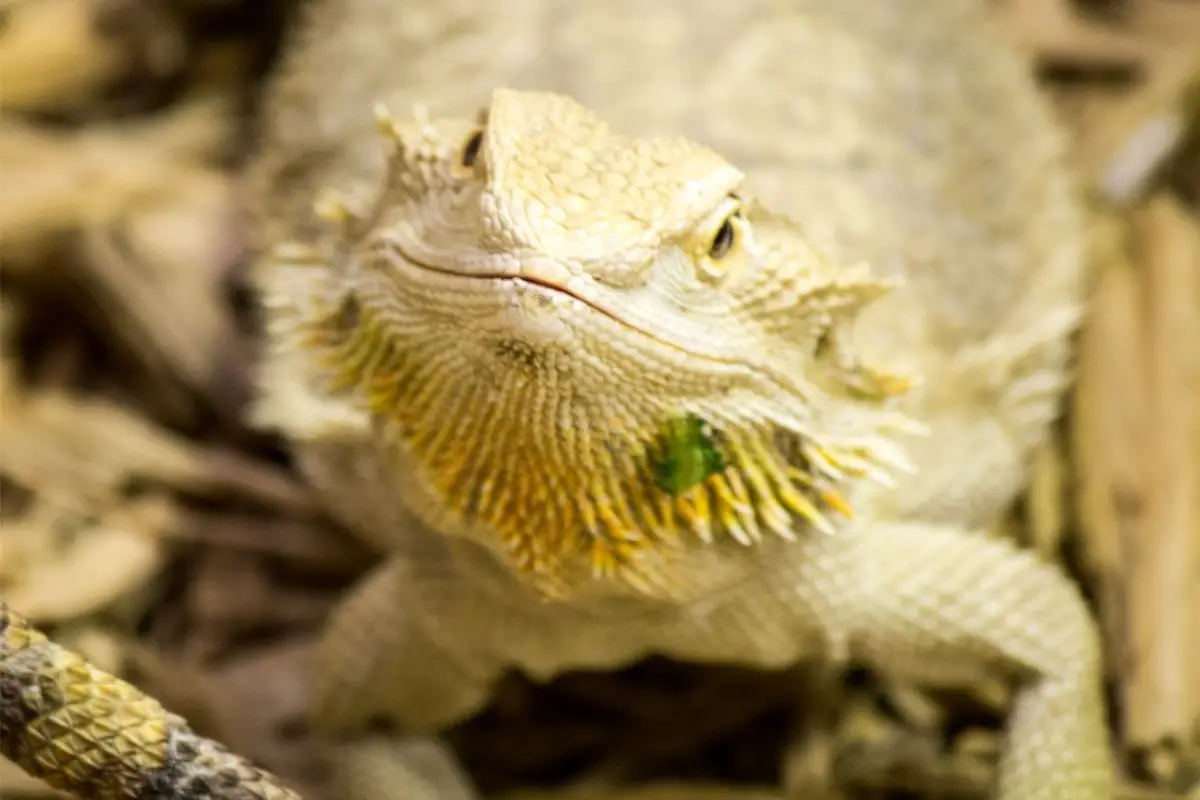Bearded dragons are reptiles native to Australia.
These animals are very docile and friendly.
They are often kept as pets because they are good at hiding from predators.
Bearded dragons are omnivorous, meaning they eat both plants and meat.

Their diet consists mainly of insects, fruit, vegetables, and other types of vegetation.
They are also known to enjoy nectar and honeydew.
It is important to note that bearded dragons are not venomous. If you accidentally touch their heads, they will shake you off.
This is normal behavior.
The only time you should worry is if they start to bite or scratch you.
In this case, you should immediately take the lizard to a veterinarian.
Despite this, it is natural for owners to be concerned about their dragons shaking their heads – and that is why we have put together everything you need to know about this common action and the action that you need to take.
Why Is My Bearded Dragon Shaking Its Head?
The most common reason for your dragon to shake its head is because it is uncomfortable.
It may feel too hot in the summer or too cold in the winter.
You can help your bearded dragon by providing an appropriate environment for it.
Make sure there is enough ventilation, and ensure that your dragon has access to fresh water.
Your bearded dragon may also shake its head when it is hungry or thirsty.
If you notice that your bearded dragon is shaking its head more frequently than usual, try feeding it some food with a high-fat content.
Try giving it some cooked chicken, beef, fish, or even cheese.
If your bearded dragon is shaking his head because he is sick, you should contact your vet right away.
Some diseases can cause your bearded dragon to shake its head.
For example, if your bearded dragon has been bitten by another animal, he may develop tetanus.
Other illnesses include:
- Fungal Infections
- Paralysis
- Brain tumors
- Heart problems
- Kidney disease
- Liver disease
- Respiratory illness
- Cancer
- Degenerative joint disease
- Poisoning
- Ear Infections
- Conditions such as yellow fever
What Should I Do When My Bearded Dragon Shakes His Head?
When your bearded dragon shakes its head, it is trying to tell you something.
Most likely, it wants to let you know that it needs attention.
If you see your bearded dragon shaking its head, make sure to give him some attention.
You should first check on your bearded dragon’s well-being.
Does it appear healthy? Are its eyes clear and bright?
Does it look like it is eating properly?
If your bearded dragon appears unhealthy, you should call your vet right away.
Once you have checked on your bearded dragon, you should then pay attention to what it is telling you.
If it seems distressed, you should provide it with comfort.
A comfortable environment will also help.
Your bearded dragon may want to show you where it hurts.
Check around its body and neck area for any signs of injury.
If you find anything suspicious, such as bleeding or swelling, you should contact your veterinarian right away.
Your bearded dragon may also want to tell you that it needs to go outside.
If you notice that your bearded dragon’s head is shaking while it is inside, you should place it outside for a few hours.
How Can I Prevent My Bearded Dragon From Shaking Its Head?
There are many things that you can do to prevent your bearded dragon from shaking its head.
Provide A Suitable Enclosure
The best way to keep your bearded dragon happy is to provide it with a safe and comfortable home.
This includes having plenty of space for it to move around, clean bedding, and fresh air.
You should also make sure that there is plenty of ventilation; bearded dragons need lots of airflow to stay cool in the summer and warm in the winter.
They also need adequate ventilation to avoid overheating or freezing.
The temperature should be closely checked and monitored – especially during the warmer months.
Be careful not to leave your bearded dragon alone.
Even though they are very friendly creatures, they still pose a danger to themselves.
Keep them in a cage that is large enough so that they cannot get out.
Make sure that the cage is secure and that it does not have any openings through which your bearded dragon could escape.
Provide A Suitable Diet

Bearded dragons require proper nutrition to grow properly.
You should feed your bearded dragon a diet that contains all of the vitamins and minerals that it requires.
It should also contain a balanced amount of protein.
Your bearded dragon should eat at least half of its weight each day.
If your bearded dragon eats too much, it may become overweight.
Overweight animals are more prone to health problems.
In addition, if your bearded dragon becomes overweight, it may be less able to exercise and play.
If your bearded dragon has been sick, you should wait until it recovers before giving it new food.
Sick animals often lose their appetite.
Give Your Bearded Dragon Enough Water
Water is essential for your bearded dragon’s survival.
Without water, your bearded dragon will quickly dehydrate, and this can be one reason why your pet is shaking its head.
You should give your bearded dragon access to fresh water every day.
If your bearded dragon lives outdoors, you should ensure that it has easy access to a pond or other source of water.
If your bearded dragon is kept indoors, you should provide it with a bowl filled with fresh water.
Is Your Bearded Dragon Suffering From Metabolic Bone Disease?
Another common and more worrying cause of your bearded dragon shaking his head is a metabolic bone disease – if you suspect that your dragon may be suffering from this, you should seek medical treatment as soon as possible.
Metabolic bone disease (MBD) is a condition that causes bones to weaken over time.
MBD occurs when an animal’s metabolism slows down because of illness or stress.
As a result, the calcium levels in the blood drop.
When this happens, the body starts to break down bone tissue instead of building new bone.
This leads to weakened bones and brittle teeth.
It also makes it harder for the animal to breathe and walk.
MBD usually affects reptiles that live in captivity.
However, some wild-caught reptiles also suffer from the condition.
What Causes Metabolic Bone Disease?
Metabolic bone disease is caused by a lack of vitamin D and a calcium deficiency.
Vitamin D helps regulate how fast the body breaks down and builds up bone.
When the level of vitamin D drops below normal, the body begins breaking down bone faster than it normally would.
This results in weaker bones.
What Are the Symptoms Of Metabolic Bone Disease?
Some symptoms of metabolic bone disease include:
- Abnormal breathing patterns
- Difficulty walking
- Drooping ears
- Weakness in legs
- Weight loss
- Brittle teeth
- Changes in skin color
If you notice any of these symptoms in your bearded dragon, you should seek veterinary treatment from a reptile expert as soon as possible.
Blood tests will be able to determine whether the condition is present, and your vet will be able to prescribe calcium powders and supplements to get your pet’s calcium level up to where it should be.
How Can I Prevent Metabolic Bone Disease?
To prevent MBD, keep your bearded dragon healthy.
If your bearded dragon suffers from a respiratory infection, make sure that it receives treatment as soon as possible.
Also, make sure that your bearded dragon gets plenty of sunlight.
The ultraviolet rays in sunlight help produce vitamin D.
If your bearded dragons have been ill, take care not to overfeed them.
Instead, only offer small amounts of food several times per week.
Make sure that your bearded dragon has access to fresh water at all times.
If your bearded dragon does have access to a pond or similar area, make sure that there are no large stones in the water.
These could damage your bearded dragon’s feet.
It is also important to monitor your bearded dragon’s weight on a regular basis.
If your bearded dragon seems to have lost too much weight, contact your vet immediately.
How Should I Handle My Bearded Dragon When He Shakes His Head?
When your bearded dragon shakes its head, you need to handle him carefully so that you don’t hurt him.
To do this, gently lift your bearded dragon onto your lap and hold him firmly with one hand while using the other hand to support his neck.
You can then use your fingers to gently stroke your bearded dragon’s chin and throat.
You should avoid touching his eyes and nose.
Also, don’t let him lick your hands.
Once your bearded dragon has calmed down, he may want to eat again.
Make sure that you give him a few minutes before offering him more food.
If you’re worried about your bearded dragon shaking its head, talk to your vet.
Your vet may be able to recommend ways to stop the problem.
Final Thoughts
Bearded dragons are very intelligent creatures.
They are very social animals who enjoy being around people.
However, they are also very sensitive to their environment.
This means that if you are unable to provide them with the right conditions, they might react badly.
If you find your bearded dragon shaking their head a lot, there could be a number of reasons and causes for this.
It is important for bearded dragon owners to take the time to familiarize themselves with common bearded dragon behaviors, as these will help you to spot something wrong more quickly.
Remember, if you are ever in doubt, you can contact a vet or reptile expert for further advice and guidance.
